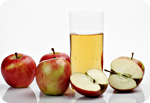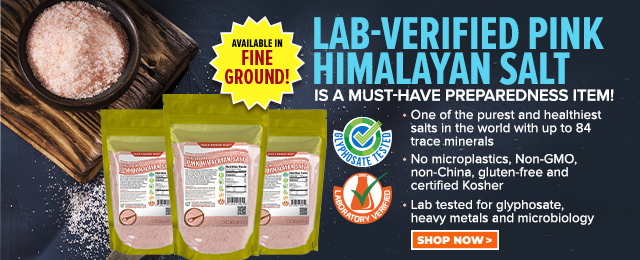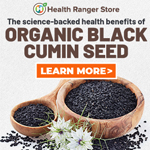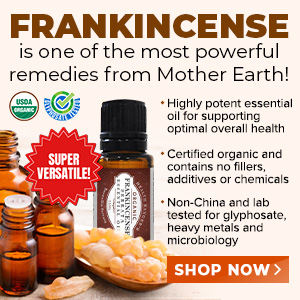
What's in an apple? Buying organic, healthful produce becomes increasingly complicated
 Monday, September 17, 2007 Monday, September 17, 2007by Mike Adams, the Health Ranger Editor of NaturalNews.com (See all articles...) Tags: organic produce, health news, Natural News |
- CLOT SHOT PLANDEMIC UNFOLDING: Fibrous, rubbery clots caused by covid injections have prion-like seeding activity
- Widespread social and economic unrest: Steve Quayle issues urgent financial warning of imminent asset collapse in new interview with Mike Adams
- DEATH by VACCINE or face PRISON time: Canadian Freedom Convoy leaders CONVICTED for protesting forced vaccination during the Covid Plandemic
- How to detox from metals falling out of the sky
- Aerosolized bioweapons? Strange “diploid biomasses” falling out of the sky in Florida captured under the microscope
- How Israeli military-connected corporations are secretly controlling your online privacy
- How the peanut allergy epidemic was fueled by faulty science and institutional arrogance
- Kiss Your Genetic Privacy Good-Bye! 23andMe Gets Green Light to Sell Your Intimate Genetic Details to Anyone They Want
- Analysis: The coming economic collapse, a mass uprising and Trump's three secret weapons to halt the growing revolt
- Thimerosal is 50 percent MERCURY and NO it has NOT been removed from vaccines - that was a BIG FAT LIE the CDC told vax skeptics to keep them vaxxed up and dying
- “Rockefeller Medicine Men”: Today’s healthcare crisis stems from the creation of the American medical establishment
- Mike Adams releases country western hit single: Goin’ Back in Time is Comin’ Home
- Global financial Ponzi scheme collapses in real time as markets plummet, Mike Adams and Steve Quayle warn of impending chaos
- EU takes aim at Elon Musk's X with potential $1 billion fine under Digital Services Act
- Defunding DEADLY mRNA jabs: Government funding for mRNA technology being scrutinized and sidelined until proven "safe and effective" for real
- European Court of Justice: Healthcare professionals who promoted or administered COVID-19 vaccines are CRIMINALLY LIABLE for any harm caused
- New York governor signs controversial gun control measure, sparking Second Amendment concerns
- Washington State expands hate crime bill but ignores left-wing violence against Tesla owners
- Aerosolized bioweapons? Strange “diploid biomasses” falling out of the sky in Florida captured under the microscope
- European Court of Justice: Healthcare professionals who promoted or administered COVID-19 vaccines are CRIMINALLY LIABLE for any harm caused
- Newly released JFK files reveal Pentagon's role in creating Lyme disease and covid in the same lab
- Analysis: The coming economic collapse, a mass uprising and Trump's three secret weapons to halt the growing revolt
- FBI imposed gag order on agents to silence Hunter Biden laptop truth before 2020 election, new chat logs reveal
- Britain’s descent into police state censorship: Parents raided for questioning their daughter’s school system online
- “Project Aldrin”: Senate probes Meta's alleged censorship dealings with China
- Kiss Your Genetic Privacy Good-Bye! 23andMe Gets Green Light to Sell Your Intimate Genetic Details to Anyone They Want
- Oncologist warns of ‘terrifyingly aggressive’ cancers in children, linked to immune suppression from COVID vaccines
- Mike Adams releases country western hit single: Goin’ Back in Time is Comin’ Home
- Utah governor allows ban on LGBT pride flags in public buildings and schools, will take effect without his signature
- AI-powered forecasting model proves more accurate than traditional systems at predicting the weather
- When antibiotics are unavailable, natural ANTIMICROBIAL compounds become essential first line defenses against infection
- German researchers find link between mRNA vaccines and GENETIC CHANGES that precede CANCER and AUTOIMMUNE DISORDERS
- Defunding DEADLY mRNA jabs: Government funding for mRNA technology being scrutinized and sidelined until proven "safe and effective" for real
- The Health Ranger releases “Vaccine Zombie” song and music video, using AI-animated zombies for the music video
- Dr. Mary Talley Bowden drops bombshells about children being permanently damaged by mRNA jabs during Tucker Carlson interview
- The hidden war above: Chemtrails, HAARP and the battle for planetary control
- Newly released JFK files reveal Pentagon's role in creating Lyme disease and covid in the same lab
- California's social media censorship law struck down: A victory for free speech or a threat to online safety?
- The Health Ranger releases “Vaccine Zombie” song and music video, using AI-animated zombies for the music video
- Dr. Mike Yeadon releases 15-minute testimony - WATCH - about genocidal intent of COVID “vaccines”
- EPA advisor admits the agency is funneling billions to climate groups ahead of Trump’s return to White House
- Rep. Nancy Mace introduces bill to ban biological males from female facilities on federal property
- Mike Adams releases country western hit single: Goin’ Back in Time is Comin’ Home
- Florida takes a stand: DeSantis proposes permanent ban on mRNA vaccine mandates
- Sugarcane extract superior to cholesterol-lowering drugs?
- Survival 101: Effective EMF blocking techniques
- OpenAI whistleblower who dissented against how the company trained ChatGPT found dead
- CONSERVATIVES SOUND THE ALARM: Big Pharma and the Left trying to force $32 billion money grab from America’s seniors into year-end spending deal
- Pilots report mysterious lights 'moving at extreme speeds' across Oregon skies
- Attorney and TikTok influencer explains how he was offered hundreds of dollars to make false claims about Trump, Republicans
- Trump reverses course on Gaza plan, says “nobody is expelling Palestinians”
- Trump expected to choose Kelly Loeffler as his agriculture secretary even though she was caught INSIDER TRADING during COVID
- MEDICAL BOMBSHELL: FDA admits Covid mRNA 'Vaccines' CAUSE CANCER
- Marketing director responsible for WOKE Jaguar rebrand is also an LGBT activist who supports Black Lives Matter
- Red Cross issues warning to stop blood plasma donations from vaccinated people
- Scientists confirm: GENIUS brain function can be spontaneously unleashed in humans without any apparent cause
- EPA advisor admits the agency is funneling billions to climate groups ahead of Trump’s return to White House
- HYSSOP: What research reveals about the health benefits of this ancient holy herb
- Two containers with completed ballots fall out of truck in Florida
- Fully vaccinated about to see “tsunami” of illness and death, warns virologist
- Global leaders unite to clamp down on “misinformation” with UN-backed Cascais Declaration
- Newly released JFK files reveal Pentagon's role in creating Lyme disease and covid in the same lab
- BREAKING: 2025 NDAA authorizes mandatory military draft of WOMEN across America… as Pentagon pursues global NUCLEAR war with both Russia and China at the same time
- Michael Yon warns of a ZIONIST TAKEOVER in Trump’s second administration
- Ozempic and Wegovy weight loss drugs are injectable LIZARD VENOM PEPTIDES that may unleash a devastating wave of organ failure… side effects align with symptoms of SNAKE BITES
- BOMBSHELL: DNA testing kits are a SCAM to develop ethnic-specific bioweapons
- The Health Ranger releases “Vaccine Zombie” song and music video, using AI-animated zombies for the music video
- Israeli soldiers accused of even more torture and abuse in the West Bank
- These 13 countries just signed an agreement to engineer a global FAMINE by destroying food supply
- NASA admits that climate change occurs because of changes in Earth’s solar orbit, and NOT because of SUVs and fossil fuels
- RFK Jr. clears key hurdle: Sen. Susan Collins backs controversial HHS nominee, signaling a new era for health policy
- Sermon 30: How Jesus reveals Caesar’s FAKE CURRENCY and FALSE AUTHORITY
This is a common conundrum among consumers: How do you decide which grocery products are best for not just your own personal health, but also the health of the planet? It's a more complex decision than it might first seem. For one thing, much of the information necessary to make an informed decision simply isn't available to consumers. There is not determined enforcement of the rule, for example, that foods are accurately labeled with their country of origin. Nor is there any requirement to disclose which foods were grown with pesticides, herbicides or other chemicals banned in the United States (and U.K.) but still legal in other places like Central and South America.
If that last sentence surprises you, it should: not one in a hundred American consumers is aware that it is perfectly legal for U.S. chemical companies to export dangerous chemical pesticides (like DDT) that have been banned for use on crops in the United States. Those pesticides are sold to countries with lower environmental and health standards which turn around and use them on crops that are exported right back to the USA. So U.S. consumers end up eating produce grown with the very same pesticides banned in the United States, and it's all perfectly legal and openly accepted by the Food and Drug Administration and U.S. Department of Agriculture.
In the U.S., there's also the issue of so-called "illegal immigrants" (which I believe to be a strange term, since in my opinion there's no such thing as an "illegal" human being). On one hand, U.S. consumers demand cheap produce that can only be grown and harvested with the help of illegal immigrant labor. On the other hand, Americans grumble about too many Mexicans migrating into California, Arizona, New Mexico and Texas, claiming they are stealing jobs and bankruptcing cities and states. And yet, not surprisingly, when most consumers have a choice between a $3 apple grown on a farm that pays legal wages to U.S. workers and a $1 apple grown on a farm that pays "illegal" wages to an undocumented worker from Mexico, most Americans will choose the $1 apple (and in doing so, they are in fact continuing to vote for the very illegal immigration they claim to oppose).
Challenging to consumers
Making an informed produce purchasing decision at the grocery store, it turns out, is nearly impossible these days. There's no way to know where the food came from, what soils it was grown in, the immigration status of those who harvested it, and which chemicals were used on it. And to make matters worse, powerful food corporations are constantly trying to water down the definition of "organic" to include the agricultural use of obscene substances such as raw human sewage. (Fortunately, that was not ultimately allowed under the "organic" label, but the food companies tried to sneak it in!)The only way to truly know where your food comes from is to know your local farmers. When you know the people growing your food, and you can meet them face to face, then you know what you're getting. That's why I'm a huge supporter of CSAs (Community Supported Agriculture), farmers' markets, backyard gardening and local food co-ops. Through organizations like these, consumers can maintain close relationships with the people who grow their food, and farmers are able to exercise far greater control over what they grow, how they grow it, and how much they get paid for it.
Large commercial food companies like ADM would prefer that farmers remain isolated from consumers. They want all the food processing to go through them first, where they set the prices and conditions that farmers are forced to accept. Other corporations have used intellectual property control over genetically modified seeds to threaten farmers who are refusing to adopt their pesticide-ready crop varieties. It's all part of a plan to control the global food supply -- an endeavor that inevitably destroys local farming as well as agricultural biodiversity (which leaves crops susceptible to future wipeouts from infectious disease).
Sure, these companies can produce a nice, round, shiny apple at the grocery store for an unbelievably low price, but at what cost to the world? The existence of that apple is based on numerous inputs that may be highly detrimental to the health of the planet as a whole: The burning of fossil fuels for farming and transportation, the use of chemical pesticides that wash downstream and poison aquatic ecosystems, the use of artificial fertilizers that lack real soil nutrition, the destruction of microbial life in agricultural soils, the loss of biodiversity and the subsequent decline in wildlife populations, and so on.
The history is all there
When you look at an apple, you're really looking at an historical account of everything that happened to bring you that apple. The whole story is written into that apple. There's the intention of the people involved with producing that apple, the health of the soils, the use of chemicals (or not) on the apple, the impact on the environment, and much more.An organic, locally-farmed apple from a small family farm tells a very different story: Respect for nature, positive intention, healthful soils, humility in nature, connection with plants and animals, biodiversity, minimal use of fossil fuels, and so on. This is the kind of apple I'd like to eat… how about you?
Now here's the real kicker in all this: When you eat an apple, you absorb and assimilate the story that went into creating that apple! So eating an organic, locally-grown, consciously-harvested apple gives you not only nourishment and biochemical nutrition, it also gives you the positive energy of abundance, humility, harmony and happiness. A conventionally-grown apple, on the other hand, is more likely to give you the story of greed, desperation, depletion, fear and disease. Is that the energy you want circulating in your veins?
An apple, you see, is made of much more than its chemical constituents. All fruits and vegetables have water, and water stores emotional energy, passing it on to those who consume the water. Since an apple is probably something like 75% water by volume, eating an apple is actually an exercise in chewing mostly on water.
Aren't you curious to know what kind of energy and intention is in that water? You should be. Because beyond the vitamins, minerals and phytonutrients in the apple, the water impacts your body, mind and spirit more than anything else. And one of the reasons we see so much obesity in America today is because people are eating empty, lifeless food products that provide only calories but no energetic nourishment. The food is mostly an empty shell, lifeless and devoid of positive vibration (and then they cook it, irradiate it and process it even more to give it shelf life!).
For the most part, the food isn't being grown, harvested and sold at a high enough vibration to end the cravings human beings have for nourishment at all levels: physical, emotional and spiritual. The food being sold today is missing something, and if you want complete food that's nourishing at all levels, I strongly recommend you grow it yourself or work with local farmers who you know are passionate about cooperating with nature to maximize abundance for themselves and those around them.
Organic produce at FETCH.news
Get independent news alerts on natural cures, food lab tests, cannabis medicine, science, robotics, drones, privacy and more.
 About the author:Mike Adams (aka the "Health Ranger") is a best selling author (#1 best selling science book on Amazon.com) and a globally recognized scientific researcher in clean foods. He serves as the founding editor of NaturalNews.com and the lab science director of an internationally accredited (ISO 17025) analytical laboratory known as CWC Labs. There, he was awarded a Certificate of Excellence for achieving extremely high accuracy in the analysis of toxic elements in unknown water samples using ICP-MS instrumentation. Adams is also highly proficient in running liquid chromatography, ion chromatography and mass spectrometry time-of-flight analytical instrumentation.
About the author:Mike Adams (aka the "Health Ranger") is a best selling author (#1 best selling science book on Amazon.com) and a globally recognized scientific researcher in clean foods. He serves as the founding editor of NaturalNews.com and the lab science director of an internationally accredited (ISO 17025) analytical laboratory known as CWC Labs. There, he was awarded a Certificate of Excellence for achieving extremely high accuracy in the analysis of toxic elements in unknown water samples using ICP-MS instrumentation. Adams is also highly proficient in running liquid chromatography, ion chromatography and mass spectrometry time-of-flight analytical instrumentation.
Adams is a person of color whose ancestors include Africans and Native American Indians. He's also of Native American heritage, which he credits as inspiring his "Health Ranger" passion for protecting life and nature against the destruction caused by chemicals, heavy metals and other forms of pollution.
Adams is the founder and publisher of the open source science journal Natural Science Journal, the author of numerous peer-reviewed science papers published by the journal, and the author of the world's first book that published ICP-MS heavy metals analysis results for foods, dietary supplements, pet food, spices and fast food. The book is entitled Food Forensics and is published by BenBella Books.
In his laboratory research, Adams has made numerous food safety breakthroughs such as revealing rice protein products imported from Asia to be contaminated with toxic heavy metals like lead, cadmium and tungsten. Adams was the first food science researcher to document high levels of tungsten in superfoods. He also discovered over 11 ppm lead in imported mangosteen powder, and led an industry-wide voluntary agreement to limit heavy metals in rice protein products.
In addition to his lab work, Adams is also the (non-paid) executive director of the non-profit Consumer Wellness Center (CWC), an organization that redirects 100% of its donations receipts to grant programs that teach children and women how to grow their own food or vastly improve their nutrition. Through the non-profit CWC, Adams also launched Nutrition Rescue, a program that donates essential vitamins to people in need. Click here to see some of the CWC success stories.
With a background in science and software technology, Adams is the original founder of the email newsletter technology company known as Arial Software. Using his technical experience combined with his love for natural health, Adams developed and deployed the content management system currently driving NaturalNews.com. He also engineered the high-level statistical algorithms that power SCIENCE.naturalnews.com, a massive research resource featuring over 10 million scientific studies.
Adams is well known for his incredibly popular consumer activism video blowing the lid on fake blueberries used throughout the food supply. He has also exposed "strange fibers" found in Chicken McNuggets, fake academic credentials of so-called health "gurus," dangerous "detox" products imported as battery acid and sold for oral consumption, fake acai berry scams, the California raw milk raids, the vaccine research fraud revealed by industry whistleblowers and many other topics.
Adams has also helped defend the rights of home gardeners and protect the medical freedom rights of parents. Adams is widely recognized to have made a remarkable global impact on issues like GMOs, vaccines, nutrition therapies, human consciousness.
In addition to his activism, Adams is an accomplished musician who has released over a dozen popular songs covering a variety of activism topics.
Click here to read a more detailed bio on Mike Adams, the Health Ranger, at HealthRanger.com.
Take Action: Support Natural News by linking to this article from your website
Permalink to this article:
Embed article link: (copy HTML code below):
Reprinting this article:
Non-commercial use OK, cite NaturalNews.com with clickable link.
Follow Natural News on Facebook, Twitter, Google Plus, and Pinterest
Science News & Studies
Medicine News and Information
Food News & Studies
Health News & Studies
Herbs News & Information
Pollution News & Studies
Cancer News & Studies
Climate News & Studies
Survival News & Information
Gear News & Information
News covering technology, stocks, hackers, and more



"Big Tech and mainstream media are constantly trying to silence the independent voices that dare to bring you the truth about toxic food ingredients, dangerous medications and the failed, fraudulent science of the profit-driven medical establishment.
Email is one of the best ways to make sure you stay informed, without the censorship of the tech giants (Google, Apple, Facebook, Twitter, YouTube, etc.). Stay informed and you'll even likely learn information that may help save your own life."
–The Health Ranger, Mike Adams













































